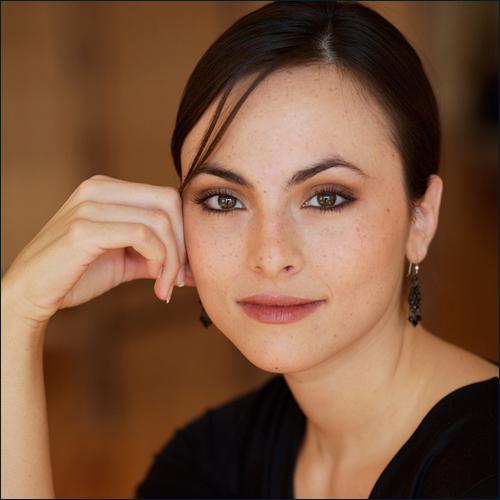
La Belle Isabel
By Sebastian Spreng, Visual Artist and Classical Music Writer
Although La belle Isabel could well be the title of a European film, this article is about the beautiful Isabel Leonard, who, as her last name suggests, is also a young lioness of the opera world. At 32, Isabel is as elusive as she is unclassifiable, and that aura of mystery accompanies her wherever she goes.
Isabel Leonard, photo by Jared Slater
The singer is scheduled to make her Miami debut on Sunday as a fitting finale to the 33 years of good music provided by the Sunday Afternoons of Music. The series was founded and directed by Doreen Marx, who is saying goodbye at this first-class event. It is sure to be an afternoon to remember, when the always youthful Doreen introduces the newcomer Leonard, a singer who since her unforgettable debut at the Met only six years ago (as the page Stephano in Romeo and Juliet, she stole much of the applause from Anna Netrebko and Robert Alagna) has achieved a string of much-talked-about successes.
Though she studied at the Joffrey Ballet School as a child, she earned her Bachelor and Master of Music degrees from the Julliard School, where she earned several honors. Her credentials also include the 2011 Beverly Sills Artist Award, the Marilyn Horne Foundation Award and the coveted Richard Tucker Award, previously won by Renée Fleming, Deborah Voigt, Joyce DiDonato and David Daniels. The latter prize catapulted her to the international stardom for which she was predestined, sooner or later.
But honors and awards are not enough. It is on the stage where you test a life devoted to singing and a career that was carefully planned and executed to the letter. She has played Cherubino, Cenerentola, Vivaldi’s Constanza, both Sestos (Mozart’s as well as Handel’s), Rosina in The Barber of Seville, Concepción in Ravel’s The Spanish Hour, La Perichole, Zerlina, Ruggiero in Alcina, an extraordinary Miranda in Thomas Adès’ The Tempest, as well as the adorable and dangerous Dorabella in the Met’s production of Cosí Fan Tutte, which marked the eagerly awaited return of James Levine.
In barely five years, Leonard has not only conquered the Met but also the Salzburg Festival, Paris Opera, Glyndebourne Festival and the opera of Munich, Vienna, San Francisco, Dallas, Chicago and Santa Fe, and has shone as a soloist in recitals that included Berlioz’s Summer Nights cycle, the songs of Reynaldo Hahn and Arnold Schoenberg, Hugo Wolf, Rachmaninoff, Brahms and Baroque melodies, and also the American repertoire, with forays into Jerome Kern, Cole Porter and George Gershwin.
Nevertheless, Isabel has particular affinity for the Spanish repertoire, and her Miami debut features it alone as “Songs of Spain”. This New Yorker, who now represents the cream of the young American generation, and who evokes the grace and charm of the young Frederica von Stade, has South American – specifically Argentine – roots. Her mother is Argentine and a large part of her family lives in Argentina, where Isabel has been traveling every year since she was a child. That trip to the Argentine north, to Santiago del Estero, connects her to a world very different from her native Manhattan. It is a journey of constant renovation that rounds out the portrait of one the most exceptional creatures to appear on the international scene in recent years. To her innate poise and elegance you add a voice like chocolate – coincidentally her great weakness – able to execute the most precise coloratura with a sensual, spicy, delicious timbre that combines the opulent darkness of a mezzo with the diaphanous luminosity of a soprano. Another good reason why she doesn’t want to be categorize as either mezzo or soprano, like Debussy’s elusive Mélisande, the enigmatic Isabel will surely enchant an audience eager to uncover her mystery.
On Sunday, May 18, music lovers have an inescapable rendezvous with Isabel Leonard and her pianist, Vlad Iftinka, to bid farewell to the Sunday Afternoons of Music in grand style. In every sense, a memorable occasion.
Recent Content
-
Artsarticle ·
-
Artsarticle ·
-
Artsarticle ·
